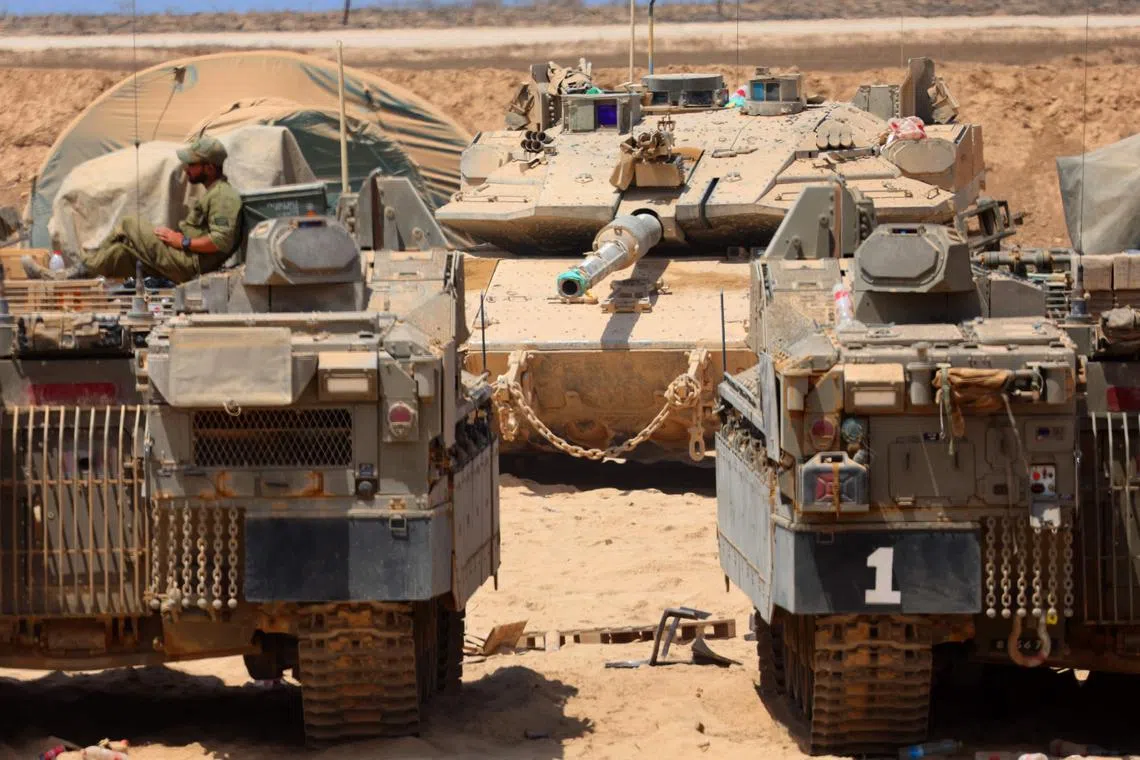Commentary
Netanyahu’s talk of peace is mere masquerade for Gaza destruction
Sign up now: Get ST's newsletters delivered to your inbox

Israeli military vehicles positioned along the border with the Gaza Strip on Aug 21.
PHOTO: AFP
LONDON – War or peace? Coming under heavy international pressure to avoid a planned military storming of Gaza City, Israeli Prime Minister Benjamin Netanyahu is now pushing a novel idea: He will continue military preparations for the offensive, but also discuss a deal to end the conflict.
On Aug 21, Mr Netanyahu said that he had “given instructions” to “begin immediate negotiations for the release of all our hostages and an end to the war, on conditions that are acceptable for Israel”.
But Mr Netanyahu spoke at the headquarters of the Israel Defence Force’s southern command, where military chiefs and members of the Israeli Cabinet gathered to approve the latest operational plans to “take control of Gaza City and defeat Hamas”.
“These two things – the defeat of Hamas and the release of all our hostages – go hand in hand,” Mr Netanyahu stated.
Hamas, the militant Palestinian organisation in control of the Gaza Strip, offered a ceasefire on Aug 18
Furthermore, in subsequent interviews with foreign media networks, Mr Netanyahu continued to claim that his objective remains the “destruction” of Hamas, rather than any accommodation with the organisation.
In all likelihood, therefore, Israel’s latest diplomatic initiative is only intended to gain time and deflect criticism.
Currently, around one million Palestinians live in the largest city in the Gaza Strip, many of them internally displaced from the north.
Israel on Aug 8 announced its intention to capture Gaza City, and an army spokesman confirmed on Aug 20 that the first steps of the operation had begun.
But the offensive, which entails fighting in built-up areas – just about the most demanding and dangerous task for any military – cannot be put together overnight.
Israel has announced the call-up of 60,000 reservists, and a further 20,000 reserve soldiers will see their current terms of service extended.
The Israeli military is already advancing on the outskirts of Gaza City, and air strikes are getting more frequent.
Two Israeli brigades – a total of about 3,500 soldiers – are currently operating in the area, and Mr Netanyahu said this week that he is “shortening the timelines” for conquering the city.
Nonetheless, current estimates suggest that it will be weeks before the full-scale planned offensive can be launched: Most reservists are asked to report to duty by Sept 2.
Still, the panic among the residents of Gaza is widespread. The Israeli military claims that it is building “humanitarian infrastructure” in the south of the Gaza Strip to accommodate those “relocated” from Gaza City.
But many of Gaza City’s residents refuse to heed Israeli warnings to leave, primarily because they are already refugees from other areas of the Strip.
Famine has already been confirmed in the vicinity of Gaza City by the Integrated Food Security Phase Classification, the global authority on hunger.
The International Committee of the Red Cross warns that “any further intensification of military operations will only deepen the suffering, tear more families apart, and threaten an irreversible humanitarian crisis”.
And in a statement issued on Aug 20, French President Emmanuel Macron warned that the planned Israeli offensive on Gaza City “can only lead to disaster” and plunge “the entire region into a cycle of permanent war”.
The Israeli government remains unrepentant. In a briefing to foreign media on Aug 21, Brigadier-General Ephraim Defrin, the Israeli military’s chief spokesman, referred to Gaza City as “a stronghold of governmental and military terror” for Hamas.
“We will deepen the damage to the terror infrastructure above and below the ground and sever the population’s dependence on Hamas,” he vowed.
So, why is Prime Minister Netanyahu now again talking about peace? Partly to deflect world criticism, and partly to balance off various domestic political calculations.
His rejection of the latest Hamas truce offer went down badly with the families of the approximately 50 Israeli hostages still held by the Palestinian organisation.
In return for a ceasefire, Hamas had offered to release 10 living Israeli hostages and the remains of those Israelis who died in captivity in exchange for 200 Palestinians serving long sentences in Israeli jails.
The Israeli government rejected this out of hand, claiming that it is no longer interested in partial exchanges; it wants all hostages released in one go.
But the rejection came at a time when public pressure inside Israel to end the war is increasing. Hundreds of thousands of Israeli protesters on Aug 17 took to the streets of Tel Aviv, the country’s biggest city, demanding a hostage deal.
This was the biggest such demonstration in a year, and some of the slogans shouted at the gathering captured the public imagination. For instance, demonstrators adapted the traditional Jewish condolence for the dead, which is “May their memory be a blessing”, into the slogan “May their memory be a deal”.
Initially, Mr Netanyahu tried to dispute the size of the anti-government demonstrations. Yet he swiftly understood that he had to make a conciliatory gesture to this domestic backlash, hence his latest offer to negotiate with Hamas.
But this, in turn, is infuriating the more extreme members of his coalition Cabinet, who want Israel to occupy all of the Gaza Strip, and are now threatening to bring down the government if Mr Netanyahu accepts any deal.
That is why the Prime Minister is now making so much noise about the impending operation to occupy Gaza City.
And that’s also why the Israeli military – otherwise very good at safeguarding the secrecy of its preparations – is now very keen for journalists to learn about its plans.
Mr Netanyahu is essentially hedging his bets by portraying himself as both a warlord and a peace-seeker.
And with many European countries now threatening to recognise an independent Palestinian state unless the fighting stops, the Israeli leader has a further incentive to play both roles.
How long this game can continue largely depends on US President Donald Trump, the only foreign leader who can influence Israel’s options.
Yet Mr Trump appears to be undisturbed by the prospect of further violence.
“We will only see the return of the remaining hostages when Hamas is confronted and destroyed!!! The sooner this takes place, the better the chances of success will be,” he wrote on Aug 18 on Truth Social, his preferred media platform.
As he frequently does, Mr Trump concluded his message with: “Thank you for your attention to this matter!”
Prime Minister Netanyahu is sure to have given this message his utmost attention.
Jonathan Eyal is based in London and Brussels and writes on global political and security matters.



